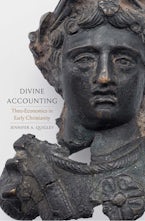
Divine Accounting
Theo-Economics in Early Christianity
Series: Synkrisis
192 Pages, 6.12 x 9.25 x 0.68 in, 1 b-w illus.
- Hardcover
- 9780300253160
- Published: Tuesday, 8 Jun 2021
$85.00
Also Available At:

192 Pages, 6.12 x 9.25 x 0.68 in, 1 b-w illus.
$85.00
Also Available At: